
By presenting a few facts about their thoughts and philosophy in this chapter, I would make an effort to being out the contradiction between the two. If the readers take a closer look at the poetry of Shah Latif and Dr. Iqbal, they will discover that their source of inspiration and ideas are quite the same. They had been deeply influenced by the Holy Prophet, the Holy Qur’an and the Mathanvi of Maulana Rome. For the information and knowledge of the reader, some extracts from the poetry of these leading poets are presented below as an evidence.
Shah Latif
One can easily see after the study of the poetry of ‘Shah Latif that he regarded it essential to understand and accept the teachings of the Holy Prophet in order to protect one self from being misguided, and be truly guided by the teachings of the Holy Prophet. He says:

Exactly in the same manner he considers the Holy Qur’an a rich source of wisdom and the knowledge of Allah, and says if we probe into the meanings of the Holy Qur’an, we shall never have to seek another source for spiritual guidance. In the following verse, he expresses this thought:

Besides the Holy Prophet and the Holy Qur’an, when Shah Latif speaks of the comprehension of truth, and elevation of man to position of honor, and being united with Allah, he considers it imperative to refer to Maulana Rome:


Dr. Mohammed Iqbal
As for Shah Latif the source of inspiration for Dr. Iqbal was the Prophet of Arabia, the Holy Qur’an and Maulana Rome. In the following verse, Allama Iqbal expresses his view about the Holy Prophet

He says at another place:
We are enlightened about Dr. Iqbal’s views about the Holy Qur'an in the following verses:
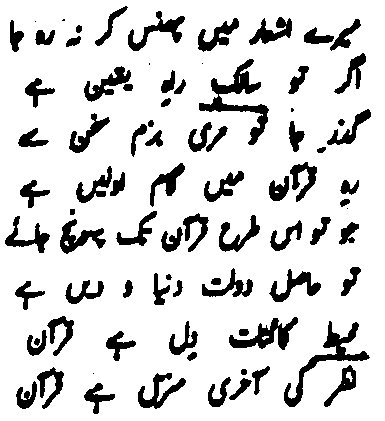
Then he expresses himself at another place in the following verse:
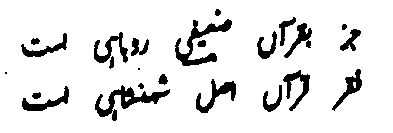
The reader can easily assess Dr. Iqbal’s devotion to Maulana Rome through his following verses:
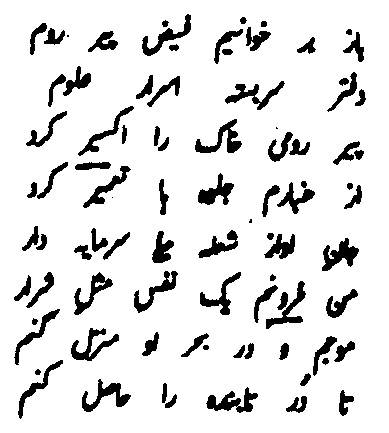
The extracts from the poetry of these national poets make it evident that the main sources of inspiration for their thought and views were the same. Moreover, a further analysis of their poetry leaves no doubt that their object was the same, which was the welfare and progress of humanity. However when the reader will contemplate their message the fact will become quite evident that to achieve this great objective they adopted the course different from each other. After considering the fundamental similarity between these two eminent national poets, I would like to highlight the basic difference or contradiction, which exists between their poetry.
The Ideas of Shah Latif
1. The Unity of Religion
Since Shah Latif believed in the philosophy of Pantheism, he was convinced of the unity as being the source of diversity. He was not prepared to accept diversity as having a separate existence. However, he believed it to be a manifestation of unity. He believed in a faith, which illustrated the idea, that "He is the friend, he is the beloved, he is the enemy and he is the protector. He considered the drum and its sound as one and indivisible:

Shah Latif, observed innumerable manifestations of this reality of truth", and had the experience of seeing each separately with the depth of understanding. But a deep contemplation of God who does not manifest Himself elevated him to such a spiritual position, that he could clearly observe the manifestation of the glory of his beloved everywhere and in every object This was, thus, the basis of his conviction that he believed in the fundamental unity of all the religions of the world, and considered creating division between people on the basis of religion contrary to the fundamental principles and doctrines of Islam.
He had read the only lesson, which unites man with Allah, and he never considered anything worthy of attention, which was contrary to this belief. Those who were his opponents, they were at the same time his friends and his protectors. The most fundamental principle of his life was his love of God, whose glory he found reflected in everything he cast his eyes upon. He had transcended far the stages of scepticism and doubt. He called the creators of hatred and division between human beings in the name of religions quacks and charlatans. Referring to people of this character, he says:

2. Sindhi Nationalism
In accordance with the injunctions of the Holy Qur'an, Shah Latif considered the entire human race as one nation. However, for the convenience of identification and from the point of view of making progress by being organized, he did not consider it a sin for a distinct and separate nationality of Sindhis. By accepting the idea of a distinct and separate identity of Sindhis, he never aimed at a division of humanity, but considered it a source of reaching the international and universal brotherhood.
He had traveled through almost the entire Sindh province and had observed it closely. The people were living in a state of total helplessness. As Shah Latif looked around he observed other nations marching on the road to progress, but the Sindhis were living a life of stagnation and indolence. They were like an orphan who had no guardian. No one cared about the neighbors, that they were passing their day and night in unmitigated misery. It was due to this lamentable state of affairs that, he spurred the people in their idea of a united Sindh or a Sindhi nationality with the purpose that people may share each other’s pain and suffering, and to develop in themselves an aspiration to contemplate the affliction and troubles of the country and steer it safely to a situation of security and safety. In this struggle, he was so deeply absorbed that he became completely oblivious to the apparent difference between religions. He espoused the cause of uniting the miserable humanity in Sindh, and addressed those living in comfort and happiness in the following manner:

Shah Latif was determined in his principle that he would liberate the Marvi of Sindh from the foreign exploitation and slavery of Umer Kot and achieves an atmosphere of freedom. He always considered himself one of the Sindhi people, and expressed his sentiment in the following manner:
He considered a collective consciousness and united struggle imperative for freedom from slavery and troubles. He said:
Then he expressed his feelings about those who were inclined toward the aliens because they had made great progress and made them develop an inferiority complex, and were contemptuous toward their backward countrymen:
In the opinion of Shah Latif, only those people have chosen this destination for themselves who are mentally divided.
3. Patriotism
The entire philosophy of Shah Latif is based upon the idea of a homeland and for him love of the country is an integral part of his faith. Through his personal experience and the knowledge of history, he had come to realize the truth that the building and formation of a nation on the basis of beliefs (Religions) does not correspond to the requirements of the time and mental standard of the people. Such ideas had no significance more than building castles in the air, and he knew that the people who promulgate such ideas and raise such slogans have no correspondence between what they desire and what they say. So, at one place addressing such people he says:
Praying for the fertility of his homeland and the prosperity of the people, he says:
The love he bore for his countryman can be assessed by his verses given below:
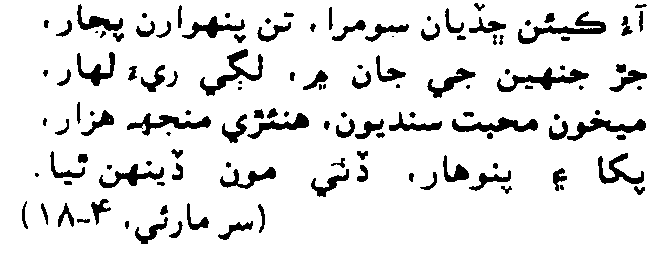
It had always been the concern of Shah Latif to see Sindh fertile, luxuriant and prosperous. He remembered the Sindhi people in his poetry by the names of Warehja, Watan Javal, Panuhara, Maro and Abana etc., and prayed for their freedom and progress. He was fully aware of the power and capabilities of the ruling class and the aliens and at the same, he knew about the weaknesses and privations of his people. So, not finding the conditions prevailing encouraging, he had attached all his hopes to natural incidents, the changes on the international level and revolutions. He had always been firm in his belief that revolution would come and there would be an upheaval in society. The new movements would completely wipe out lassitude from their hearts, and the people living under oppression since centuries would be inspired with a new spirit Those who have been deprived would get what is their by right, and the tyrants and the exploiters would be exiled. The really patriotic Sindhis would sow the seed of genuine freedom through their courage and determination, and would reap the fruits of joy, comfort, peace and security.
4. SeparatIon of Religion from Politics
In the light of history Shah Latif had seen the harm, which can been done by allowing religion and politics to go together. He was thoroughly aware of the fact that neither the majority of Muslims have a correct conception of Islam, nor the rulers have the quality of true cognizance of God nor the spirit to serve the people. Instead of running the affairs of the state and the government in conformity with Islamic system, it was being ‘i~ d to serve the personal and class interests of the rulers. The people had become extinct who were sincere in maintaining the affairs of the state under the influence of religion, and at the same time had the ability to achieve this aim. Expressing his despair to remember such people, he says:

He could very well see that the ruling class was using religion and Shariah (religious law) as an instrument to cover up their evils and to maintain and consolidate their power, and he could see that the religious priests (Maulvis and Mullahs) who had found favor in the court offered interpretations of Islam and its tenets at the behest of their masters, which was simply intended to serve their purpose. He expresses his opinion about such people in the following verse:

Shah Latif was aware of the fact that personal nd class interests always conflicted with the interest of the people, and whenever the affluent and the ruling class raised the slogan of religion, they did so without any sincerity in their hearts. This is the stratagem they normally use to deceive the common man. Therefore, he expresses his opinion about such people in the following verse:

5. Nonaggression
Shah Latif never encouraged the people to take up arms except for resistance against aggression or liberating the nation from slavery. Under any guise he was firmly opposed to oppression and aggression, and always condemned those who possessed belligerent mentality... The following verse is adequately reflective of his thoughts on this subject:

However, this view of Shah Latif does not mean that he was convinced of the policy of non-violence, or he was giving a lesson of cowardliness or discouraged people from making sacrifices while putting-up resistance against the enemy or for their freedom. The following verse of Shah Latif will easily serve to eliminate any such impression:

About the courageous and the brave who wage a war for a true cause and who are prepared to lay down their lives in the defense of freedom, he says at one place:

Instead of being overawed by the strength, armies and military superiority of the enemy in the battlefield, he praises the spirit of sacrifice of those who fight for truth, and condemns the cowards and deserters. These are his feelings about such people:

The Ideas Of Dr. Iqbal
1. Deism
Contrary to the view held by Shah Latif, Dr. Iqbal considered the philosophy of Pantheism as an obstacle in the progress of the nations. In his opinion the supremacy of man’s existence did not consist in his elimination of self and being absorbed in the supreme Being, but the culmination of human existence, consists in that man should develop in himself the capacity to elevate the self to such a level that he could absorb the Omnipotent in himself. He says that:

Dr. Iqbal sharply criticized the celebrated European philosopher Hegel simply because he believed in the philosophy of Pantheism:

Like Hegel, Dr. Iqbal remembered the great philosopher Plato by the name of "the old man," and "one of the group of ancient goats because of his difference from the idea that the world is transient. In the opinion of Dr. Iqbal such philosophical views, instead of inspiring the nations with a new life, only serves to put them to a sleep of death.
Shah Latif is the torchbearer of the thought of elf-abnegation and being absorbed in the supreme. Being:
However, Dr. Iqbal oes not accept this idea of Shah Latif, and sees contained everything in the human ego, which be has preached through his poetry. He says:


Dr. Iqbal was a staunch advocate of human individuality, and felt the need of guidance by a ‘perfect man’ for the progress and reformation of the human race. It was his firm belief that Muslims being the followers of Islam (the faith strictly in conformity with nature) are suited to provide guidance to man. In his view, the Muslims are the guardians of this faith of nature and a source of united action, and salvation of humanity from its existing adversities and troubles is possible only through the Muslims. Here he expresses his views in the following verses:
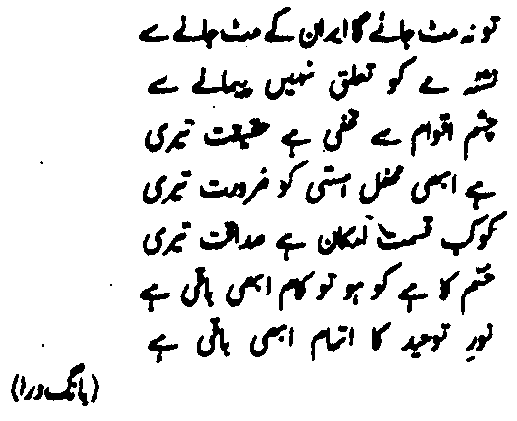
2. The Separate Nationality of Muslims
In accordance with the views mentioned above, Dr. Iqbal considers all the Muslims a separate and distinct nation on the basis of religion. In his view the idea of nationality based on the country, race or color is antiquated. There is a clear evidence of this idea of Dr. Iqbal in the following verses. (From Ramooz-e-Bekhudi-the secrets of the self abnegation):
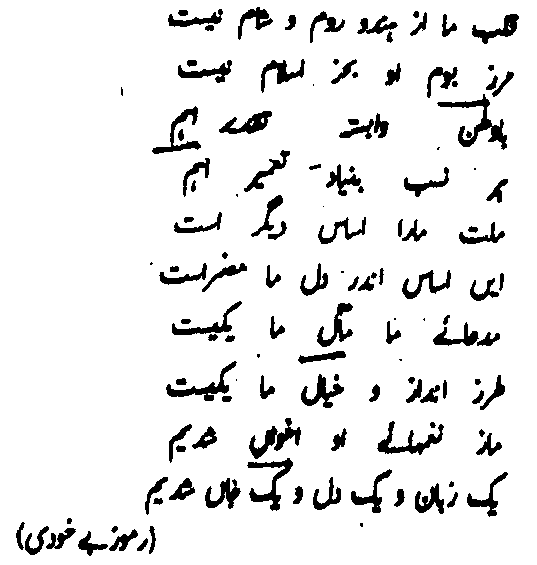
About those nations of the world whose existence is based on nationalism, Iqbal has this to say:

3. Opposition of Nationalism
Basing the foundation of nationalism on religion, Dr. Iqbal considers the concept of patriotism equivalent to idolatry and regards as poison for religion. He also considers the concept of nationalism the root cause of mutual disputes and quarrels between the nations, and considers this concept responsible for the tendency among some nations to occupy other countries to serve their trade interests. He is firmly opposed to the idea of dividing humanity into the confines territory and countries, and counsels Muslims to never consider themselves attached to one particular country, and considers the entire world as their homeland.
The following verses of Dr. Iqbal illustrate his concept of nationalism:
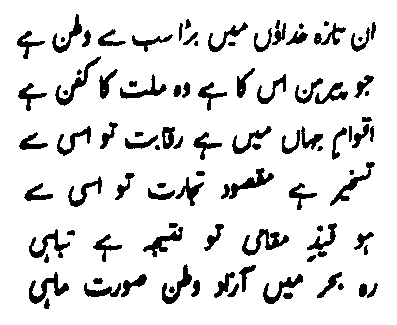
The poet counsels the Muslim nation that the entire world is its homeland, exactly is the fish can range the entire expanse of the ocean as its own territory:

Dr. Iqbal expresses his views in the following verses about those nations of the world whose foundation is the concept of nationalism.
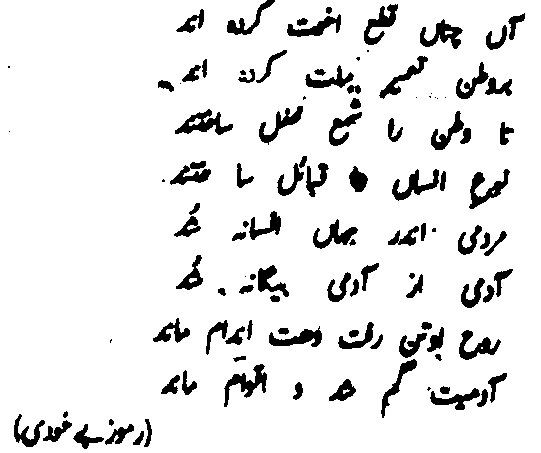
4. Amalgamation of Religion and Politics
Dr. Iqbal never supported the idea of keeping religion and politics apart. Considering Islam pre-eminently capable as religion of administration and discipline, he considered its guidance essential in every problem of life. It was through Islam, as an administrative force, he wanted to establish justice and equity in order to bring about peace and security in the world.
He does not like the political systems of today in which politics and religion are kept apart. He firmly believes, that politics after being separated from religion has lost its real spirit and the formal treaties, pacts, laws and regulations have completely lost their effectiveness:

Then he expresses his opinion about this theme in the following verse:

He reminds the Muslims of today of their glorious past when the commander of the Muslim forces also performed the duty of leading the Muslims in prayer. He used to carry the sword in his hand and the Holy Qur’an around his neck. It was his responsibility to provide guidance for the Muslims in religious as well as secular affairs. It is in this manner that Dr. Iqbal counseled Muslims to lead and guide the world. Reminding the present generation of Muslims, he gives them an advice in the following verse.
5. Aggressive mentality.
Considering that Muslims possess all those characteristics, which qualify them eminently to lead the world, he desires the domination of Islam and the establishment of the caliphate of the entire Islamic world. He counsels the Muslims to launch a Holy war with the purpose of making the whole world the world of Islam, and keeps them reminding that they have attained the age of youth growing in the shadow, of the sword, and their national symbol is the crescent which symbolizes a curved sword. Arousing this spirit among the Muslims, he expresses himself in the following verses:

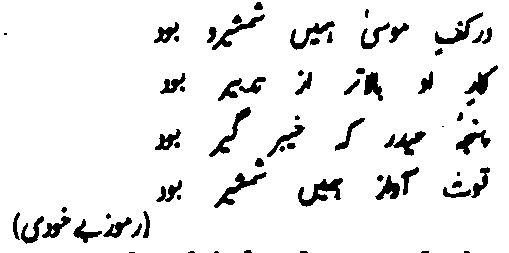


After a brief discussion of the conflicting views of Shah Latif and Dr. Iqbal, it becomes quite evident, that each from his point of view, desired the progress and welfare of the human race, and desired to awaken the nation with the purpose of stimulating them into action. Although through the message they have given in their poetry each has followed a different course, yet despite their conflicting views there are quite a number of ideas in which they hold a unanimous opinion. Following are some examples.
1. Advice about love.
In the opinion of both, love is the remedy of every national malady. They firmly believed in the principle that human existence without love is lifeless. Unless a nation entirely goes through an experience of love, it is not capable of making any great achievement. Shah Latif expresses his views in the following verse.


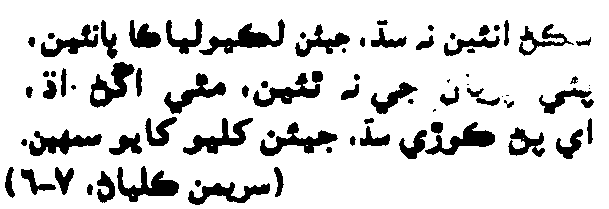
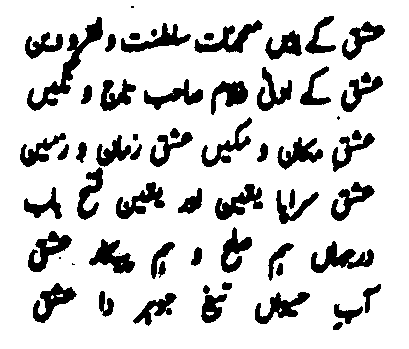

2. The Spirit of Sacrifice
Both the poets are unanimous that no nation can achieve independence and progress without facing the dangers courageously and showing patience and perseverance in the face of suffering and persecution. Expressing his view Shah Latif says in the following verse:
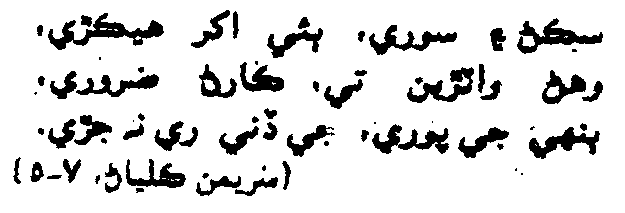

Dr. Iqbal expresses his idea about the theme in the following lines.

3. Self-knowledge
Shah Latif and Allama Iqbal, both were deeply influenced by this Qura'nic Verse, which means that whoever develops the knowledge of self only he can developed the understanding of God and Shah Latif counseled the nation to develop the capability of self-knowledge:
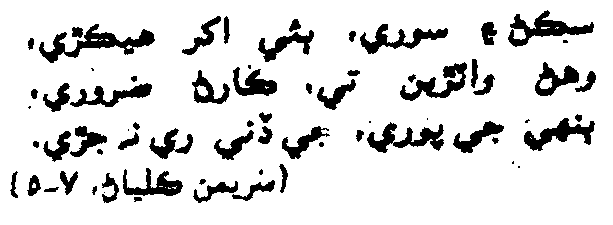


Dr. Iqbal offers his advice to know one self in the following verse:
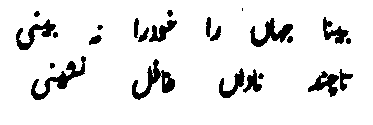
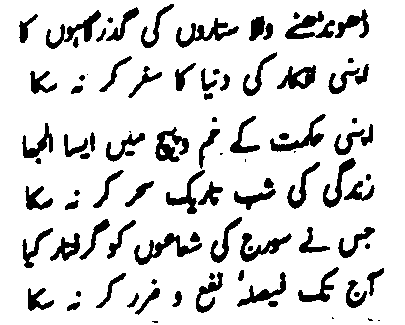
Besides the aforementioned points in which we observe unanimity of views between the two poets, there are quite a number of aspects of their teachings, which conflict with each other. For instance, the teachings of Shah Latif advocate the development of the tendency toward equality, tolerance and democracy, while on the other hand Dr. Iqbal, in his poetry, arouses the spirit of dictatorship, fascism and national superiority.
Shah Latif desired to bring about the progress and development of the Sindhis without discrimination of religion and nationality, before the nations of the world, while, on the other hand Dr. Iqbal dreamed of the Muslims as one strong nation to lead the nations of the world through the virtues of courage and justice. As Hitler considered it the prerogative of the German nation to assume the leadership of other nations on the basis of numerical superiority, in the same manner Dr. Iqbal desired to assign to the Muslims the leadership of the entire world on the basis religious superiority.